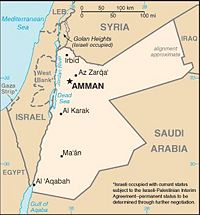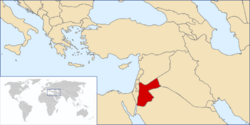Jordan
| Hashemite Kingdom of Jordan اَلمَمْلَكَة اَلأُرْدُنِيَّة اَلهَاشِمِيَّة Al-Mamlakah Al-Urduniyyah Al-Hashimiyyah |
||||||
|---|---|---|---|---|---|---|
| Map of Jordan
|
||||||
| Location of Jordan
|
||||||
|
||||||
| Motto: Arabic: الله، الوطن، الملك Transliteration: Allah, Al-Watan, Al-Malek Translation: God, Country, The King |
||||||
| Anthem: عاش الملك The Royal Anthem of Jordan (As-salam al-Malaki al-Urdunni)[a] Long Live the King |
||||||
| Patron Saint(s): Saint John the Baptist | ||||||
| Capital | Amman | |||||
| Official language(s) | Arabic | |||||
| Ethnic groups | Arab 98% Circassian 1% Armenian 1% |
|||||
| Demonym | Jordanian | |||||
| Government | Constitutional monarchy | |||||
| - | King | Abdullah II | ||||
| - | Prime Minister | Fayez al-Tarawneh | ||||
| Legislature | Parliament | |||||
| - | Upper house | Senate | ||||
| - | Lower house | Chamber of Deputies | ||||
| Independence | ||||||
| - | End of British League of Nations mandate | 25 May 1946 |
||||
| Area | ||||||
| - | Total | 89,342 km2 (112th) 35,637 sq mi |
||||
| - | Water (%) | 0.8 | ||||
| Population | ||||||
| - | July 2011 estimate | 6,508,271 (106th) | ||||
| - | July 2004 census | 5,611,202 | ||||
| - | Density | 68.4/km2 (133st) 138.8/sq mi |
||||
| GDP (PPP) | 2011 estimate | |||||
| - | Total | $36.893 billion (98th) | ||||
| - | Per capita | $5,899 (108th) | ||||
| GDP (nominal) | 2011 estimate | |||||
| - | Total | $29.233 billion (90th) | ||||
| - | Per capita | $4,674 (96th) | ||||
| Gini (2002–03) | 38.8 (medium) | |||||
| HDI (2011) | ||||||
| Currency | Jordanian dinar (JOD) |
|||||
| Time zone | UTC+2 (UTC+2) | |||||
| - | Summer (DST) | UTC+3 (UTC+3) | ||||
| Drives on the | Right | |||||
| Internet TLD | .jo, الاردن. | |||||
| Calling code | 962 | |||||
| a. ^ Also serves as the Royal anthem. | ||||||
Jordan (Arabic: الأردنّ, al-ʾUrdunn), or the Hashemite Kingdom of Jordan, is a country in the Middle East. It is bordered by Syria to the north, Iraq to the northeast, Saudi Arabia to the east and south, and Israel and West Bank to the west. It shares with Israel the coastlines of the Gulf of Aqaba and the Dead Sea.
History
In antiquity, the present day country of Jordan became a home for several ancient kingdoms including: the kingdom of Edom, the kingdom of Moab, and the kingdom of Ammon. The chief city of the Ammonites was Rabath Ammon (modern Amman)[1] named after Ammon, himself. The Moabites and Ammonites settled the plateau east of the Dead Sea[2] and many also spread into Syria and Iraq. According to the Biblical Archaeology Review, they remain in the area to this day:
| “ | So what did happen to the Ammonites? The Babylonians did not destroy them when they wiped out Judah. Instead, Ammonite culture continued unscathed, and the Ammonites prospered right through the sixth century B.C.E. ... Although the Persians no doubt exercised suzerainty over the area, the basic Ammonite culture, including language and pottery techniques, continued just as it had been when Ammon was independent.[3] | ” |
A prophecy in the Book of Jeremiah compares them to an old bottle of wine which has aged without being disturbed, its "lees" have been allowed to settle at the bottom (Jeremiah 48:11). Other prophecies in Isaiah show them still living near Palestine in the end-time (Isaiah 11:14) and that they would be a small people.
Jordan later became part of the Islamic Empire across its different Caliphates stages including Rashidun Caliphate, Umayyad Caliphate, and Abbasid Caliphate. After the decline of the Abbasid, Jordan was ruled by several conflicting powers including the Mongols, the Crusaders (who called the region Oultrejordain), the Ayyubids and the Mamluks until it became part of the Ottoman Empire in the 16th century. After World War I, various parts of the former Ottoman Empire in the Middle East were restructured. The Emirate of Transjordan was the name given by the British to about 80% of what they had been given as the Palestine mandate. It became an autonomous political subdivision of Palestine under British administration under the nominal auspices of the League of Nations. During this time it was ruled by King Abdullah I. For most of its history since independence from British administration in 1946, Jordan was ruled by King Hussein (1953-1999).
See Also
References
External Links
- Government of Jordan
- CIA World Factbook - Jordan
- Jordan at UCB Libraries GovPubs
| ||||||||||||||||||||




